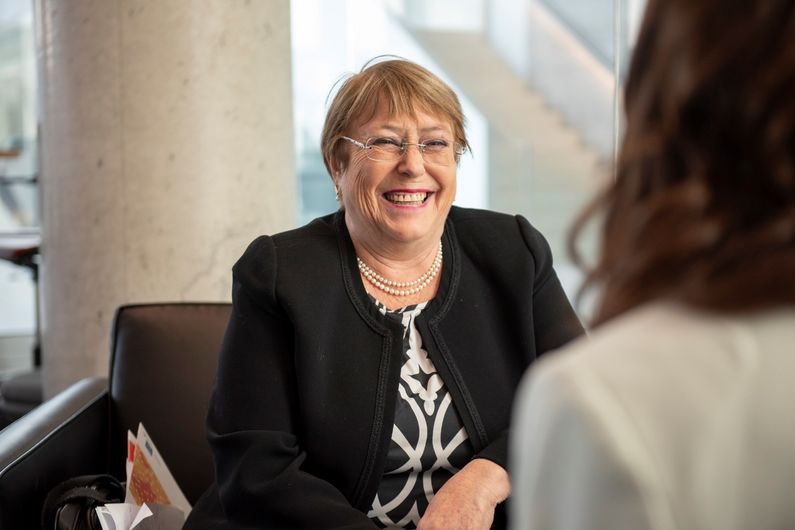Interview with Michelle Bachelet
- UdeMNouvelles
04/22/2024
Speaking before hundreds of people at the MIL campus, Michelle Bachelet reiterated the importance of human-rights-based approaches to resolving global crises.
Hundreds gathered in the atrium of Université de Montréal’s MIL campus on April 15 to celebrate the 20th anniversary of the Montreal Centre for International Studies (CÉRIUM). The guest of honour was Michelle Bachelet, former United Nations High Commissioner for Human Rights and the first woman to serve as president of Chile. In her address, Bachelet, who is touted by the Chilean press as a future candidate for UN secretary-general, stressed the importance of human-rights-based approaches to resolving the many crises facing our world today.
To watch the conference again, click here.
What are your thoughts about the situation in the world right now?
We live in complicated and dangerous times. The world is faced with numerous crises that threaten human rights, and yet the international community is not committed enough to finding solutions. The war in Gaza is one example. I expected a stronger response to protect civilians. Negotiating a temporary ceasefire is not enough. We have to end this war that is inflicting untold suffering on women and children. It’s terrible to witness the international community failing to stop the warring parties. And now rising tensions between Israel and Iran are threatening to ignite a conflict that could engulf the entire Middle East. More countries need to speak out.
In light of this, is the Universal Declaration of Human Rights still relevant?
Yes, I believe it is and even more important than ever. Let me remind you that the Universal Declaration of Human Rights was ratified by all UN member states. The UN has enough rules and standards. The problem is that there are no consequences for failure to honour one’s commitments. We cannot blame the Declaration, which embodies the values we have agreed to respect, for the acts of certain states.
You are particularly concerned about protecting the rights of women. Yet these rights are being eroded around the world, from Afghanistan to the United States. What can be done to stop this?
We have to better support community organizations that are doing practical work to improve women’s living conditions and advance their rights. Currently, the money dedicated to these organizations worldwide is equivalent to the cost of a single F16 fighter jet. It’s not enough! We need to give these organizations better financial and political support. We also need more women in politics, in decision-making roles where they can promote real gender equality, locally, nationally and internationally. Some people dream of seeing a woman as UN secretary-general one day.
Does that role interest you?
I haven’t thought about it. But I do believe we need more women in public life. António Guterres, the current UN secretary-general, is making enormous efforts to improve gender parity within the UN. This is also important symbolically because it gets people used to seeing women in power and dispels stereotypes. I'm very concerned about the erosion of women’s rights.
Climate change and loss of biodiversity are the great challenges of this century. At COP28, countries agreed to set up a fund to compensate developing countries for losses and damage caused by climate change. Is this enough to achieve climate justice?
It’s a first step but it’s not enough to solve all the problems. The countries that are least responsible for climate change are suffering the most from it. The economic impacts on vulnerable countries, such as island nations and countries in Central America and Africa, are enormous. There are countries that must continually rebuild after hurricanes. There are also middle-income countries that don’t qualify for funding from the richest countries, such as Caribbean nations, which are heavily dependent on tourism. We have to find more flexible mechanisms to support these countries. Nor does this loss-and-damage fund address the problem of intergenerational injustice for younger generations suffering the consequences of choices made by previous generations.
What role do universities and scientific research play in the fight to protect human rights?
Your institution has the power to produce a new generation committed to equity and justice. Your research can lead to public policies that promote equality and inclusion. In politics, immediate emergencies can obscure the big picture. But at universities, you have the opportunity to think deeply and find solutions to the most pressing problems; you have academic freedom and the luxury of time. Centres of knowledge are where we imagine and build nations. You play a crucial role.




















